| James Brown: born May 3, 1933 (read more)“Soul Brother Number One,” “the Godfather of Soul,” “the Hardest Working Man in Show Business,” “Mr. Dynamite” — those are mighty titles, but no one can question that James Brown earned them more than any other performer. Other singers were more popular, others were equally skilled, but few other African-American musicians were so influential over the course of popular music. And no other musician, pop or otherwise, put on a more exciting, exhilarating stage show: Brown’s performances were marvels of athletic stamina and split-second timing.” ~Richie Unterberger (allmusic.com) |
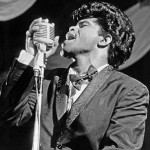 |
| Bob Dylan: 4th Slow Train Coming Recording Session, 3 May 1979 (read more) “Today I’m accused of being a follower of religion. But I’ve always been a follower! My thoughts, my personal needs have always been expressed through my songs; you can feel them there even in ‘Mr Tambourine Man’. When I write a song, when I make a record, I don’t think about whether it’ll sell millions of copies. I only think about making it, the musical end-product, the sound, and the rhythmic effect of the words. It’s purely a technical piece of work because the most important thing is to come out with something that’s perfect artistically. Even Charlie Chaplin used to say that and I respect him for that judgment.” ~Bob Dylan (to Sandra Jones – June 1981) |
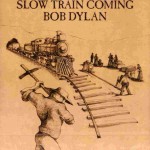 |
| Peter “Pete” Seeger (May 3, 1919 – January 27, 2014) was an American folk singer and activist. A fixture on nationwide radio in the 1940s, he also had a string of hit records during the early 1950s as a member of the Weavers, most notably their recording of Lead Belly’s “Goodnight, Irene”, which topped the charts for 13 weeks in 1950. Members of the Weavers were blacklisted during the McCarthy Era. In the 1960s, he re-emerged on the public scene as a prominent singer of protest music in support of international disarmament, civil rights, counterculture and environmental causes. | 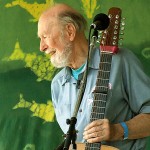 |
| Dave Dudley (May 3, 1928 – December 22, 2003), born David Darwin Pedruska, was an American country music singer best known for his truck-driving country anthems of the 1960s and 1970s and his semi-slurred baritone. His signature song was “Six Days on the Road,” and he is also remembered for “Vietnam Blues,” “Truck Drivin’ Son-of-a-Gun,” and “Me and ol’ C.B.”. Other recordings included Dudley’s duet with Tom T. Hall, “Day Drinking,” and his own Top 10 hit, “Fireball Rolled A Seven,” supposedly based on the career and death of Edward Glenn “Fireball” Roberts. | 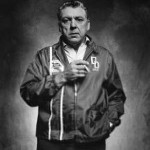 |
| “It Wasn’t God Who Made Honky Tonk Angels” (recorded: May 3 1952 Castle Studios – Nashville, Tennessee). Written by J. D. “Jay” Miller, and originally recorded by Kitty Wells. It was an answer song to the Hank Thompson hit “The Wild Side of Life.”The song — which blamed unfaithful men for creating unfaithful women — became the first No. 1 Billboard country hit for a solo female artist. In addition to helping establish Wells as country music’s first major female star, “It Wasn’t God…” paved the way for other female artists, particularly Dolly Parton, Patsy Cline, Loretta Lynn, and Tammy Wynette, and songs where women defied the typical stereotype of being submissive to men and putting up with their oft-infidel ways. | 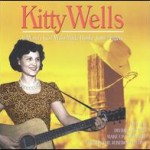 |
| Bruce Springsteen: Shoreline Amphitheatre Mountain View,CA May 03, 1988 (read more) | 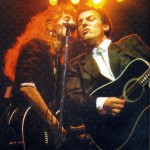 |
| Neil Young: New Orleans Jazz and Heritage Festival, May 03, 2009 (Videos) | 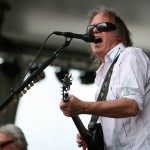 |
Spotify Playlist – May 03 |
|
